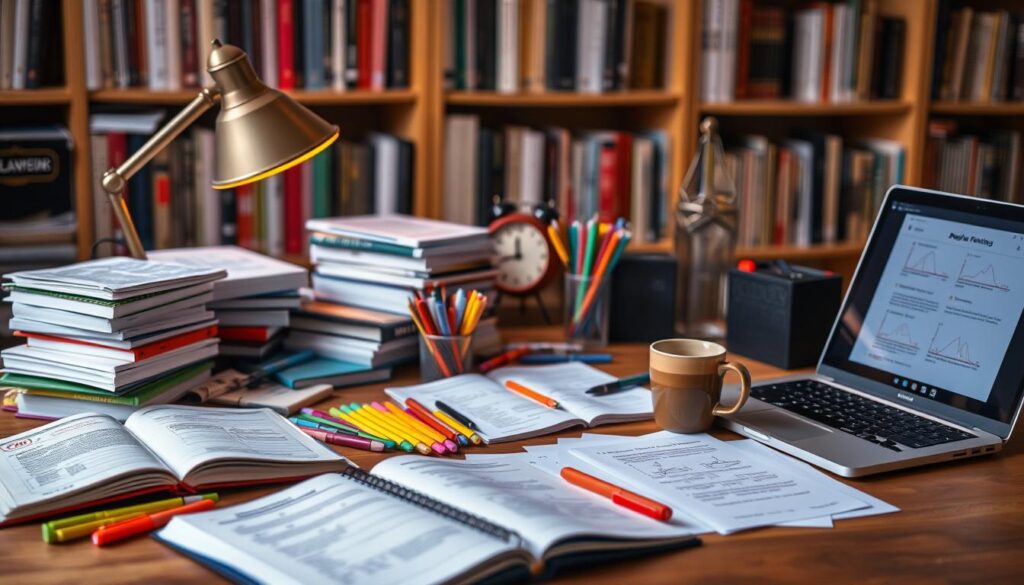Getting ready for exams is key to doing well in school. It’s not just about remembering facts. It’s about making a plan to learn and do your best.
By finding the right study tools and using smart learning methods, you can do better on your exams.
Key Takeaways
- Develop a realistic study schedule to manage your time effectively
- Prioritize your study materials and focus on the course’s main concepts and objectives
- Utilize active learning techniques, such as creating study aids and explaining concepts aloud
- Practice problem-solving by working through practice problems and old exams
- Explore a variety of study resources, including textbooks, online materials, and collaborative study groups
Develop a Strategic Study Plan
Starting your exam prep with a solid study plan is key. It means managing your time well and picking the right study materials. This way, you make sure you hit all the important course objectives and key concepts.
Create a Realistic Study Schedule
First, figure out how much time you have to study and mark it on your calendar. Research shows that studying for 1 hour each day for 20 days is better than studying for 10 hours for 2 days before a test. Break your study time into short, focused sessions. This helps you learn better than long, cramming study sessions.
Prioritize Your Study Time and Materials
Sort your study materials into smaller topics or chunks. Then, plan to tackle them one by one. Spend about 2 hours studying each day for a five-day plan. Mix up your study with prep and review to keep your learning sharp.
Identify the Course Objectives and Main Concepts
Look over the course syllabus and objectives to find the main topics and concepts. Use active learning methods like self-testing, practice problems, and concept maps. This ensures you really get the material. Regularly check your study plan to tweak it for better results.
“The accepted rule is to study two hours for every one hour of class time, which might vary based on new technological advancements in research and writing efficiency.”
Utilize Active Learning Strategies
Passive reading and re-reading don’t work well. Instead, use active learning techniques to really get the material. These methods make you actively process the info, not just look at it.
Create Study Aids
Make your own study aids like summaries, outlines, and concept maps. These tools help you organize and see the big picture. They make it easier to spot connections between topics.
Explain Concepts Aloud
Imagine you’re teaching someone else. Explaining concepts aloud in your own words helps you really understand. It also shows where you might need more practice.
Relate to Real-Life Examples
Link what you’re learning to real-life examples and your own experiences. This makes the info more interesting and easier to remember. Try to find ways to use what you’re learning in everyday life.
Using these active study strategies will help you do well in your classes. The goal is to engage with the material, not just glance over it.
“Cognitive science research indicates that active studying methods lead to better retention of information compared to passive studying.”
Practice Problem-Solving

For technical courses, it’s key to work on practice problems and old exams. This helps you learn common problem-solving techniques and problem patterns. You can then use these skills on new exam questions. Make sure to understand each step and explain your reasoning.
Work Through Practice Problems and Old Exams
The For the Win! platform has over 15,000 problems from big math contests. It also has hundreds of videos for popular math books and classes. Plus, it includes problems from top competitions.
The MATHCOUNTS Trainer has thousands of problems from MATHCOUNTS competitions. It offers full solutions for every problem. The AoPSWiki is also a great resource. It has tutorials, problem solutions, and articles on math topics, all made by the AoPS community.
Identify Common Techniques and Problem Patterns
Working on practice problems and old exams helps you spot common techniques and patterns. Recognizing these can make solving new problems easier. It also helps you build strong problem-solving skills.
| Resource | Description |
|---|---|
| ARML Problem Books | Four problem books covering ARML and NYSML competitions |
| Mandelbrot Competition Books | Available at Art of Problem Solving |
| Mu Alpha Theta.org | Hosts past contest problems |
| Noetic Learning Challenge Math | Offers problem-solving for elementary students |
| Ivana Alexandrova’s Weekly Math Problems | Target high school students |
Remember, regular practice and active learning are crucial for improving your problem-solving skills. By mastering common techniques and problem patterns, you’ll be ready for any exam question.
Study Resources

Getting ready for exams means using many study resources. You need everything from textbooks and lecture notes to online resources. Trying different ways to learn can really help.
Textbooks, Lecture Notes, and Online Resources
Start by going over your textbooks and lecture notes carefully. Make sure you get the main ideas and how they work. Then, use online resources like videos, simulations, and websites for more help and examples.
Attend Review Sessions and Office Hours
Going to review sessions with your teacher is very helpful. It’s a chance to clear up any questions and dive deeper into the material. Also, don’t miss out on office hours with your teacher. They can give you one-on-one help and advice.
Collaborate with Study Groups and Tutors
Being part of a study group is great for learning. You can talk over ideas, find weak spots, and solve problems together. A tutor can also give you focused help and teach you in a way that fits you best.
Using a wide range of study resources helps you learn everything you need for exams. It makes sure you’re ready for success in school.
Implement Effective Study Habits

Good study habits are key to doing well in school. One smart way is to study in short, regular sessions. This method, called “spaced practice,” helps you remember things better and understand them deeper. It’s better than trying to cram all your studying into one big session.
Also, try to stay focused by avoiding distractions and not doing too many things at once. This will help you learn better and faster.
Distribute Your Study Time (Spaced Practice)
Studies show that studying in short, regular sessions is better than cramming. Breaking your study time into smaller parts helps you remember things longer. It also helps you understand the material better.
Eliminate Distractions and Multitasking
Don’t try to do many things at once while studying. Research says multitasking doesn’t help you learn better and can even hurt your grades. Instead, get rid of distractions like social media, phone alerts, and background noise. This will help you stay focused on what you’re studying.
Vary Your Study Environment
Changing where you study can keep you interested and prevent boredom. Try studying in different places, like the library, a quiet café, or outside. Even small changes, like the lighting or your posture, can make studying more enjoyable and productive.
“The key to effective studying is not just the time spent, but how that time is used. Incorporating active learning strategies and creating a conducive study environment are essential for academic success.”
By using these study habits, you can learn more and do better on exams. Remember, regular practice and staying engaged are the keys to a successful study routine.
Prepare for Different Exam Formats
Exam prep isn’t a one-size-fits-all deal. The type of test you face can change how you study. Let’s look at how to adjust your study plan for various exam types.
Practice Writing Essay Outlines and Responses
Essay exams demand strong writing skills. Begin by making detailed outlines for your essays. Get used to common essay questions and try different ways to organize your thoughts. Also, practice writing essays under timed conditions to get used to the exam pace.
Self-Test with Flashcards and Practice Quizzes
For multiple-choice and short-answer exams, you need different skills. Use flashcards to test yourself on important terms and concepts. Studies show that self-testing can boost memory and retention by up to 50%. Add timed quizzes to your routine to improve your test-taking skills.
Knowing the exam format and practicing the right skills can boost your confidence. This way, you’ll do well, no matter the question types.
Also Read : Ace Your Exams: Essential Exam Tips For Success
“A study by Brown, Roediger, and McDaniel found that spacing out retrieval practice sessions throughout the semester can lead to a 70% or greater increase in retention compared to massed practice.”
Stay Focused and Motivated
Studying for exams can be really tough on your mind. It’s important to take breaks to avoid getting too tired. Short breaks can help you recharge and keep your energy up.
Also, rewarding yourself after hard study sessions can be a great motivator. It keeps you excited and focused on doing well.
Keeping a positive attitude is also crucial. Believe you can do well and imagine yourself succeeding. This mindset can really boost your performance and make studying easier.
To stay focused and motivated, use a mix of strategies. Study hard, take breaks, reward yourself, and stay positive. This way, you can tackle exam prep more efficiently and confidently.
FAQs
Q: What are some effective tips for finding the best study resources for exam preparation?
A: Some effective tips include researching online study platforms, checking for free study resources, and utilizing study skills tools like flashcards to help you study. Additionally, consider attending workshops or academic coaching sessions to enhance your study strategies.
Q: How can time management improve my exam study?
A: Time management is crucial for effective exam study. By creating a structured schedule, you can allocate specific time slots for different subjects, ensuring you cover all material. This helps reduce stress and allows for more focused study sessions.
Q: What should I include in my study guide?
A: Your study guide should include key concepts, summaries of each topic, important dates, and practice questions. Incorporating different study strategies, such as mind maps or flashcards, can also enhance your understanding and retention of the material.
Q: Are there any workshops available that can help college students with their study skills?
A: Yes, many colleges offer workshops focused on study skills. These workshops often cover topics like note-taking, time management, and effective exam preparation strategies, helping college students to improve their overall student success.
Q: What study skills are most beneficial for a college student preparing for exams?
A: Beneficial study skills include active reading, effective note-taking, summarizing information, and using study games to make learning interactive. Additionally, developing organizational skills to keep track of assignments and deadlines is essential.
Q: How can I find free resources to help with my exam study?
A: To find free resources, explore online educational platforms, library databases, and university websites. Many institutions provide free versions of study materials, including textbooks and practice exams, which can significantly aid your preparation.
Q: What are some new study strategies I can implement for better retention?
A: New study strategies include the use of spaced repetition, which helps reinforce learning over time, and active recall, which involves testing yourself regularly. Incorporating technology, such as virtual study groups or apps for organizing notes, can also enhance your study effectiveness.
Q: How can I effectively keep track of my study schedule and assignments?
A: Utilizing organizational tools like planners, digital calendars, or to-do list apps can greatly help you keep track of your study schedule and assignments. Setting reminders for deadlines and study sessions can also ensure you stay on top of your academic responsibilities.
Q: What features should I look for in online study resources?
A: Look for features like interactive quizzes, video tutorials, and forums for discussion with peers. Resources that offer personalized study plans or adaptive learning technologies can also help you tailor your study experience to your individual needs.
Source Links
-
- https://mcgraw.princeton.edu/undergraduates/resources/resource-library/preparing-for-exams
- https://www.princetonreview.com/college-advice/how-to-study-for-a-test
- https://lsc.cornell.edu/how-to-study/studying-for-and-taking-exams/the-five-day-study-plan/
- https://www.intelligent.com/create-a-study-plan/
- https://www.cgs.pitt.edu/why-cgs/mccarl-center/academic-success-resources/active-study-strategies
